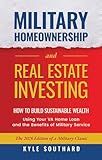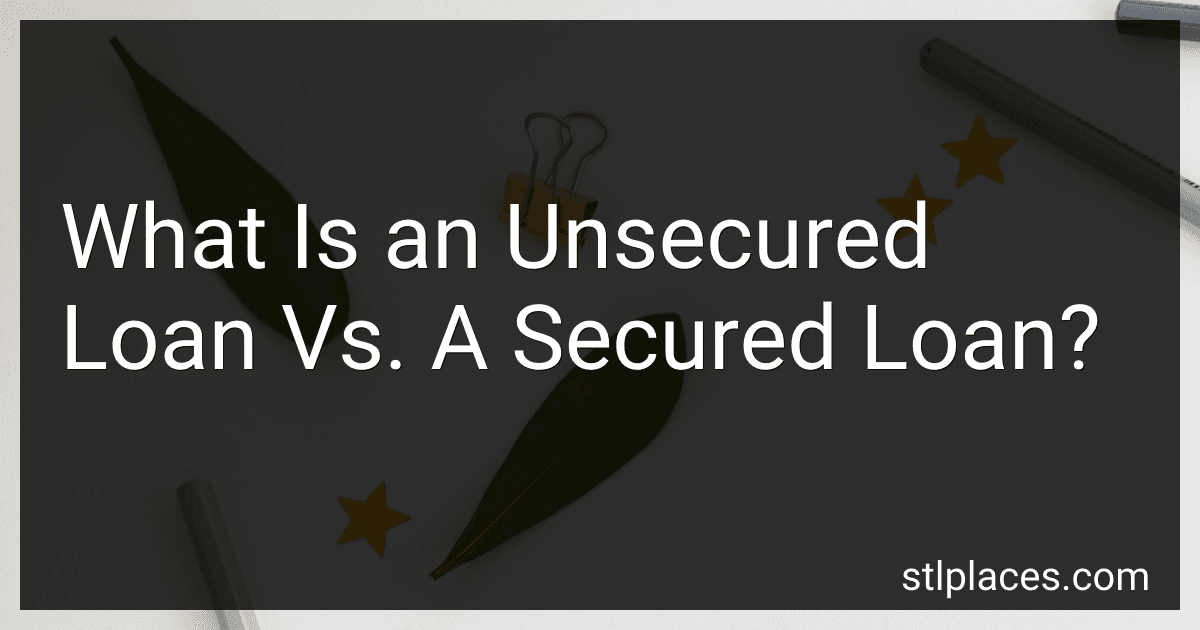Best Loan Comparison Guides to Buy in March 2026

NO-STRESS HOME BUYING GUIDE: Everything You Need to Know to Buy Your First Home with Confidence (Calypso Keys: Real Estate Made Simple)



Home Sweet Home - A Step-by-Step Guide for First Time Home Buyers: Empowering Tips, Strategies and Checklists to Simplify Your Path to Homeownership



Military Homeownership and Real Estate Investing: How to Build Sustainable Wealth with Your VA Loan and the Benefits of Military Service



Moving to Charleston South Carolina: Relocation Guide for Families, Military, Retirees (South Carolina Relocation Guides)


An unsecured loan and a secured loan are two different types of borrowing options for individuals.
An unsecured loan is a loan that is not backed by any collateral or asset. This means that the lender does not have any claim on a specific asset, such as a house or a car, in case the borrower fails to repay the loan. Due to this lack of collateral, unsecured loans pose a higher risk for lenders. Consequently, obtaining an unsecured loan can be more difficult and may require a stronger credit history and a higher credit score. If approved, the loan terms, including the interest rate and repayment period, are typically based on the borrower's creditworthiness and income.
On the other hand, a secured loan is a loan that is secured by collateral or an asset. The borrower pledges a specific asset, such as a house, car, or savings account, as collateral to secure the loan. This provides a form of security for the lender because if the borrower defaults on the loan, the lender can seize the asset and sell it to recover the loan amount. Since secured loans are less risky for lenders, they are generally easier to obtain, even for individuals with lower credit scores. The interest rates for secured loans are often lower compared to unsecured loans because the collateral reduces the risk for the lender.
In summary, the key difference between an unsecured loan and a secured loan lies in the presence or absence of collateral. Unsecured loans are not backed by any specific assets, making them riskier for lenders and often requiring a stronger credit history. Secured loans, on the other hand, are backed by collateral, making them less risky for lenders and more accessible to borrowers, even with low credit scores.
What are the consequences of defaulting on an unsecured loan?
Defaulting on an unsecured loan can have several consequences, which may vary depending on the specific terms and conditions of the loan agreement and the laws of the relevant jurisdiction. Here are some potential consequences:
- Damage to Credit Score: The most common consequence of defaulting on any loan is a significant negative impact on your credit score. This can make it difficult for you to obtain credit in the future, as lenders may see you as a higher risk borrower.
- Collection Efforts: When you default on a loan, the lender may begin aggressive collection efforts to recover the money owed. This may involve phone calls, letters, or even legal actions to collect the unpaid debt.
- Legal Action: In some cases, the lender may choose to take legal action against you to recover the outstanding amount. This can lead to additional costs, court fees, and potential wage garnishment if a judgment is obtained against you.
- Debt Collection Agencies: If the lender is unable to collect the debt, they may sell it to a debt collection agency. The agency will then attempt to recover the amount owed, often using more aggressive tactics.
- Financial Penalties: Defaulting on a loan can result in financial penalties like late payment fees, additional interest charges, and increased borrowing costs in the future.
- Loss of Collateral: If the loan was secured by collateral, such as a house or a car, defaulting may result in the loss of the asset used as collateral. The lender can repossess or foreclose on the asset to recoup their losses.
- Avoidance of Future Credit: Defaulting on a loan can make it difficult, if not impossible, to obtain credit in the future. Lenders may be hesitant to lend money to someone with a history of defaulting on loans, making it harder to access credit cards, mortgages, or other types of loans.
It's important to note that consequences may vary depending on factors such as the lender's policies, loan amount, local regulations, and individual circumstances. If you find yourself in a situation where you might default on an unsecured loan, it's recommended to contact your lender to discuss possible solutions, such as modifying the payment terms or creating a repayment plan.
Can you provide a simple definition for an unsecured loan and a secured loan?
An unsecured loan is a type of loan that is not backed by any collateral or asset. This means that the borrower is not required to provide any security against the loan and it is issued solely based on the borrower's creditworthiness and income. In case of default, the lender has no specific asset to claim as repayment.
On the other hand, a secured loan is a loan that is secured or backed by collateral or an asset. The borrower is required to provide something of value, such as a house, car, or savings account, as security for the loan. If the borrower defaults on the loan, the lender can seize and sell the collateral to recover its losses.
Are there any government regulations that specifically relate to secured or unsecured loans?
Yes, there are government regulations that specifically relate to secured and unsecured loans. These regulations are in place to protect borrowers and ensure fair lending practices. Here are a few examples:
- Truth in Lending Act (TILA): TILA requires lenders to disclose the terms and costs of loans to consumers, including annual percentage rates (APR), finance charges, and repayment terms. This regulation applies to both secured and unsecured loans.
- Equal Credit Opportunity Act (ECOA): ECOA prohibits lenders from discriminating against borrowers on the basis of race, color, religion, national origin, sex, marital status, age, or receipt of public assistance. This applies to both secured and unsecured loans.
- Fair Credit Reporting Act (FCRA): FCRA regulates the collection, dissemination, and use of consumer credit information. It gives consumers the right to access their credit reports and dispute inaccurate or incomplete information. This applies to both secured and unsecured loans since credit reports are used in evaluating loan applications.
- Home Mortgage Disclosure Act (HMDA): HMDA requires certain lenders to collect and report data about their mortgage lending activities, including information about loan types (secured or unsecured), loan purposes, loan amounts, and borrower characteristics. This regulation specifically focuses on secured loans for residential properties.
- Consumer Financial Protection Bureau (CFPB) Regulations: The CFPB has implemented various regulations to provide greater protection to consumers in the lending industry. These regulations include the Ability-to-Repay rule, which applies to mortgage loans and requires lenders to ensure borrowers can repay the loan, and the Payday Lending Rule, which provides certain protections for borrowers of short-term, small-dollar loans.
It is important to note that these regulations may vary by country and jurisdiction.
Are there any specific terms or conditions associated with unsecured loans?
Yes, unsecured loans typically have specific terms and conditions that borrowers need to be aware of. Some common terms associated with unsecured loans include:
- Higher interest rates: Unsecured loans often have higher interest rates compared to secured loans. This is because the lender doesn't have any collateral to minimize their risk.
- Creditworthiness requirements: Since unsecured loans rely heavily on an individual's creditworthiness, lenders may have strict eligibility criteria. Borrowers with poor credit scores may face difficulties in getting approved or may be offered higher interest rates.
- Loan limits: Unsecured loans usually have lower limits compared to secured loans. The loan amount is determined based on the borrower's income, credit history, and debt-to-income ratio.
- Shorter repayment terms: Unsecured loans often come with shorter repayment periods. The tenure can range from a few months to a few years, depending on the lender and loan amount.
- Prepayment penalties: Some lenders may charge a prepayment penalty if the borrower repays the loan before the agreed-upon term. This penalty is implemented to compensate the lender for potential interest income they would have received if the loan was repaid in full over the entire term.
- Personal guarantee: In certain cases, lenders may require a personal guarantee, where the borrower provides a guarantee from their personal assets or a co-signer with a strong credit history. This helps secure the loan for the lender.
It's important to carefully review the terms and conditions of any loan before agreeing to it. Additionally, specific terms and conditions may vary depending on the lender, loan amount, and borrower's creditworthiness.
Do interest rates vary for secured loans depending on the type of collateral?
Yes, interest rates for secured loans can vary depending on the type of collateral being used. Lenders assess the risk associated with the collateral and may offer different interest rates accordingly. Generally, the value, liquidity, and marketability of the collateral will be taken into consideration. For example, assets like real estate or highly valuable items may often result in lower interest rates compared to less valuable or easily disposable assets. Additionally, factors like the borrower's creditworthiness and the overall economic conditions can also influence the interest rates on secured loans.
